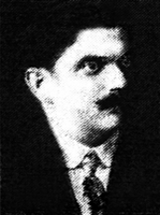U.Porto Memory
University of Porto Famous Alumni
António Joaquim de Sousa Júnior
 |
António Joaquim de Sousa Júnior 1871-1938 Physician, politician and university teacher |
António Joaquim de Sousa Júnior was born in Praia da Vitória, Terceira Island, Azores, on 16 December 1871. He was the son of António Joaquim de Sousa, a merchant, and Maria Júlia de Sousa Lemos.
 He studied at the Seminary and High School of Angra. In Porto, he attended the Polytechnic Academy and the Medical-Surgical School (1892-1898). He graduated in 1898 and became a doctor of Medicine in 1900, with the presentation of the inaugural dissertation entitled "Contribuição para o diagnóstico da tuberculose urinária: clínica, cystocospia, uroscopia e bacterioscopia"[Contribution to the diagnosis of urinary tuberculosis: clinical, cystocospia, uroscopia and bacterial meningitis]. This thesis was supervised by Agostinho António do Souto and dedicated, among others, to his family, to the teachers Ricardo Jorge and Alberto de Aguiar, to the faculty of the Medical-Surgical School, in particular to Professor Augusto Brandão, and to the teachers of the Polytechnic Academy, especially to the Count of Campo Belo and Dr. Ferreira da Silva.
He studied at the Seminary and High School of Angra. In Porto, he attended the Polytechnic Academy and the Medical-Surgical School (1892-1898). He graduated in 1898 and became a doctor of Medicine in 1900, with the presentation of the inaugural dissertation entitled "Contribuição para o diagnóstico da tuberculose urinária: clínica, cystocospia, uroscopia e bacterioscopia"[Contribution to the diagnosis of urinary tuberculosis: clinical, cystocospia, uroscopia and bacterial meningitis]. This thesis was supervised by Agostinho António do Souto and dedicated, among others, to his family, to the teachers Ricardo Jorge and Alberto de Aguiar, to the faculty of the Medical-Surgical School, in particular to Professor Augusto Brandão, and to the teachers of the Polytechnic Academy, especially to the Count of Campo Belo and Dr. Ferreira da Silva.
He worked as a doctor, politician, and teacher at the Medical-Surgical School of Porto between 1903 and 1915 and between 1918 and 1928. In 1903, he was appointed substitute teacher of the Department of Surgery, in 1911 extraordinary professor of Surgery, with the regency of the chair of Therapeutics and Surgery Technique, and in 1921, the chair of Pathological Anatomy.
António de Sousa Júnior was part of the complex and controversial campaign to eradicate bubonic plague in Porto. In 1902, he took over as chief physician of the Bonfim Hospital, and in 1904, during the outbreak of the pneumonic influenza in the Sé neighbourhood, in Porto, he was the only doctor at Bonfim Hospital. The work he carried out earned him the gold medal of the Royal Humane Society of Porto, a distinction previously only attributed to D. Pedro V for his dedication to the cholera morbus patients.
As an expert in the fight against epidemics, Sousa Júnior returned to his hometown, leading a health mission to Terceira Island, Azores, during the outbreak of the bubonic plague that scourged this Azores Island in 1908. Vitorino Nemésio would publicly show his admiration for Sousa Júnior, confessing he was embarrassed for "combining the momentum to speak of António Joaquim de Sousa Júnior without protocol or agenda, with plenty of pure soul and the obligation to be courteous and acknowledging the man who allows me to do so today ".
Having returned to Porto, Sousa Júnior ran the Medical-Surgical School (by decree of 1 November 1910) and also the Laboratory of Pathological Anatomy (by decree of 26 June 1926). At the university, in 1924 he held the positions of Vice-Rector of the University of Porto (by decree of 29 January) and Rector of the University of Coimbra (by decree of appointment on 21 June, and of revocation, at his request, on 21 August).
 Sousa Júnior wrote numerous scientific articles in "Gazeta Médica do Porto", "Porto Médico", "Gazeta dos Hospitais", of which he was the editor. He edited works on themes such as Social History, the plagues that struck the country, the alleged falsification of wines and the supply of water to Porto, and coordinated the work "Electoral Census of Mainland Portugal" (1916). He wrote on Republican topics and was prominent in promoting the arts and literature in Portugal.
Sousa Júnior wrote numerous scientific articles in "Gazeta Médica do Porto", "Porto Médico", "Gazeta dos Hospitais", of which he was the editor. He edited works on themes such as Social History, the plagues that struck the country, the alleged falsification of wines and the supply of water to Porto, and coordinated the work "Electoral Census of Mainland Portugal" (1916). He wrote on Republican topics and was prominent in promoting the arts and literature in Portugal.
He embraced politics as an office member and senator (1911), Minister of Education (1913-1914 and 1924-1925), President of the Autonomous Board of Porto, Director-general of Statistics (1915-1918) and President of the Senate of the Porto City Council between 14 October 1921 and 22 October 1924.
He participated in World War I as chief of the health services in the Portuguese Expeditionary Corps (1916-1918).
Sousa Júnior was an affiliated member of the Progressive Party and of the Portuguese Republican Party, joining the Directory of this party in 1913. He became a Mason in 1909. He was also a member of the International Society of Surgery of Brussels, of the Portuguese Society of Natural Sciences and of the Society of Medicine and Surgery of Porto. He was awarded the Grand-Cross of the Order of Christ. As the Minister of Education, he was a major contributor to the creation of the first "Drama School" established in Portugal.
António Joaquim de Sousa Júnior was married to Rosário Fernandes de Sousa. For health reasons, he retired in 1928. He died 10 years later on 7 June 1938.
(Universidade Digital / Gestão de Informação, 2011)
Last updated: 2024-07-11 Webpage created on: 2024-09-01 03:09:20 Complaint Portal